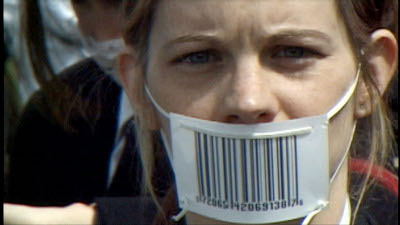This is a story on the New York City Police Department and actions they are undertaking. The questions asked have a wider societal impact, and thus we wanted to share it with our readers.
 You are walking down the street. You are stopped, ordered to spread, frisked by police, your identity checked, and questioned. There was no probably cause to stop you, this is a random check. You are found carrying no weapons or drugs, your identity does not bring up any hits on wants or warrants.
You are walking down the street. You are stopped, ordered to spread, frisked by police, your identity checked, and questioned. There was no probably cause to stop you, this is a random check. You are found carrying no weapons or drugs, your identity does not bring up any hits on wants or warrants.
So other than the indignity – visited far more often on young Black and Hispanic men than anyone else – other than the demeaning nature of the encounter, it’s over, right?
WRONG. All of your biographical information will now be stored indefinitely by the New York City police in a data base according to Police Commissioner Ray Kelly.
“used primarily by department investigators during the course of a criminal investigation”
If you are not shocked by this, why not? Whether or not you are, you should read Bob Herbert’s New York Times column yesterday, Watching Certain People, which will be the basis of this posting.
Perhaps it is my age and my memory. I remember the NY Cops (and those in other cities) keeping files on suspected communists. I remember the military acting similarly, with massive files kept at Fort Holabird of people suspected of being threats. Sometimes all such people had done is criticized the actions of their government.
One need not be as ancient as one in his 7th decade. In the last administration the Army was spying on my religion – Quakers – because we are religiously opposed to war: that somehow makes us a threat to this nation’s security? We learned about No Fly lists – and somehow I always suspected Teddy Kennedy’s name kept coming up as a form of harassment because there was no check on whose name was on those lists and why. There was John Poindexter’s Total Information Awareness, data mining, that the Congress thought it had stopped, but somehow Rumsfeld did an end run by purchasing information from commercial sources. And then of course there is also the NSA spying, accomplished by telecomms violating extant law yet the gutless US Congress gave them immunity for those violations.
 Let me return to Herbert’s column. He raises objections because of the racist nature of the data gathered. From 2004-2009 there were almost 3 million stops, 88.2% of which were people guilty of nothing.
Let me return to Herbert’s column. He raises objections because of the racist nature of the data gathered. From 2004-2009 there were almost 3 million stops, 88.2% of which were people guilty of nothing.
Out of 2,798,461 stops:
- 1,444,559 were of Blacks
- 843,817 were of Hispanics
- 287,218 were of whites
The most recent Quick Facts data set from the US Census is for 2006, at which time the demographics shown were from the 2000 census and were as follows:
- 44.7% White
- 26.6% Black
- 27.0% Hispanic
Thus showing the racial disproportion of those being stopped, whose data is being gathered and kept.
Herbert writes:
Still, day after day, the cops continue harassing and degrading these innocent New Yorkers, often making them line up against walls, or lean spread-eagled on the hoods of cars, or sprawl face down in the street to be searched like criminals in front of curious, sometimes frightened, sometimes giggling, sometimes outraged onlookers.
If the police officers were treating white middle-class or wealthy individuals this way, the movers and shakers in this town would be apoplectic. The mayor would be called to account in an atmosphere of thunderous outrage, and the police commissioner would be gone.
But the people getting stopped and frisked are mostly young, and most of them are black or brown and poor.
And since 2006 the information gathered has been accumulated into a data base used for law enforcement investigations. A data base of which the executive director of the New York Civil Liberties union has said
This is a massive database of innocent, overwhelmingly black and Latino people
Commissioner Kelly has said that the information in the data base could be used in the course of a criminal investigation to determine whether or not some was in a particular place at a particular time. As Herbert concludes in response to this
His example would suggest that the innocent people stopped are nevertheless permanently under suspicion, which is, of course, the case.
Let me step back. Police right now can obtain all your phone records and credit card receipts and if you have a transponder for tolls on that as well. But for those purposes they in theory are supposed to get a warrant. Of course the rules for the FBI are different under federal law, with National Security Letters allowing them to bypass the Courts, even though the entire purpose of the FISA setup was to provide an appropriate venue for investigation of matters of national security.
The government wants ISPs to keep ALL of our records and Google to keep all of our searches for several years, to facilitate further investigations. We may not YET have government cameras covering all public spaces, but since there is no expectation of privacy in a public space police can easily obtain surveillance videos from non-governmental sources and do not need warrants unless the owner/operator of the video requests it.
We have very little expectation of privacy now.
We have prosecutors who will fight using DNA to clear people who have been wrongly convicted, but who want to keep DNA taken in the process of an investigation permanently.
All that is left is to require every American to have a device implanted upon us at birth that permanently tracks where we are at all times. The technology already exists, does it not?
I am as far as I know in no DNA data base. Having served in the military, my fingerprints are on file. I presume every traffic ticket I have ever received is part of some data base. I do not know if the times I have been questioned by police (as a witness) are part of computerized records. That I appeared for jury duty but did not serve is certainly part of the massive amount of information available about me.
In my younger days I first worked with computers in the Marine Corps at Quantico. There was an incident with a vehicle that left a scene. We knew make, color, and that it had an enlisted sticker. Our records were on punch cards. Within less than 5 minutes we had the car, the owner and the license information and was able to stop it before it could leave the base. That took far longer than a similar search would today – a few key stroke, and if the car had an anti-theft device or GPS locator authorities could quickly pinpoint the location.
Our zone of privacy is shrinking incredibly. Those of us who participate actively in communities like this will find our privacy diminished even further. I do not mask my identity, which means I receive many unsolicited electronic communications, identifying me by name. While these do not yet rise to the level of the hate mail featured each weekend on the front page of Daily Kos, it is interesting to see how visible I am.
But I choose to be visible, fully knowing that anything I post is there forever. That is different than being a young Black or Hispanic male who gets stopped for no good reason by NYC cops, is treated in a demeaning fashion in front of others, and that incident becomes part of permanent data base to be used for future criminal investigations.
Someplace we must draw the line. Some how we must insist to our government that this massive gathering of information is not justifiable by the threats to public order. Somehow the idea that threats are such that limits on authorities demanded by our founders are obsolete – or as some in the last administration said of Geneva Conventions “quaint” – has to be vigorously opposed.
It is unacceptable to me that we strive mightily to replace political administrations in part because of their abuses of of power and authority only to see their successors continue such policies largely unchanged. We have seen that pattern in Washington in the transition from Bush to Obama, and when it comes to NY police if anything the department under Bloomberg (and Kelly) is in some ways worse than that under Giuliani (and convicted felon Kerik).
How far are we willing to let the police go? How we answer that question in a sense will determine how far we are willing to abandon the Constitutional protections under which we are supposed to be able to operate.
What I want to know is who will step up? Where are the political leaders to speak out against this kind of police operation? Where are those elected officials who are going to demand oversight of law enforcement and intelligence officials, at local, state and national levels of government?
If those we elected on our behalf will not protect our interests from abuses, what purpose do they serve?
How far are we willing to let the police go?
I have no complete answer, but this I know – what the New York City police is doing is going too far.
What about for you?
About Kenneth J. Bernstein
 Kenneth J. Bernstein, is a National Board Certified Social Studies teacher at a high school in Maryland. With degrees in Music, Education and Religion, he writes on a wide variety of subjects and has had work appear in print or online at The Washington Post, Teacher Magazine, The New York Times, and elsewhere. As a teacher of government to high school students, he takes the Constitution and Bill of Rights very serious. He blogs at the Daily Kos and elsewhere as “teacherken.”
Kenneth J. Bernstein, is a National Board Certified Social Studies teacher at a high school in Maryland. With degrees in Music, Education and Religion, he writes on a wide variety of subjects and has had work appear in print or online at The Washington Post, Teacher Magazine, The New York Times, and elsewhere. As a teacher of government to high school students, he takes the Constitution and Bill of Rights very serious. He blogs at the Daily Kos and elsewhere as “teacherken.”

